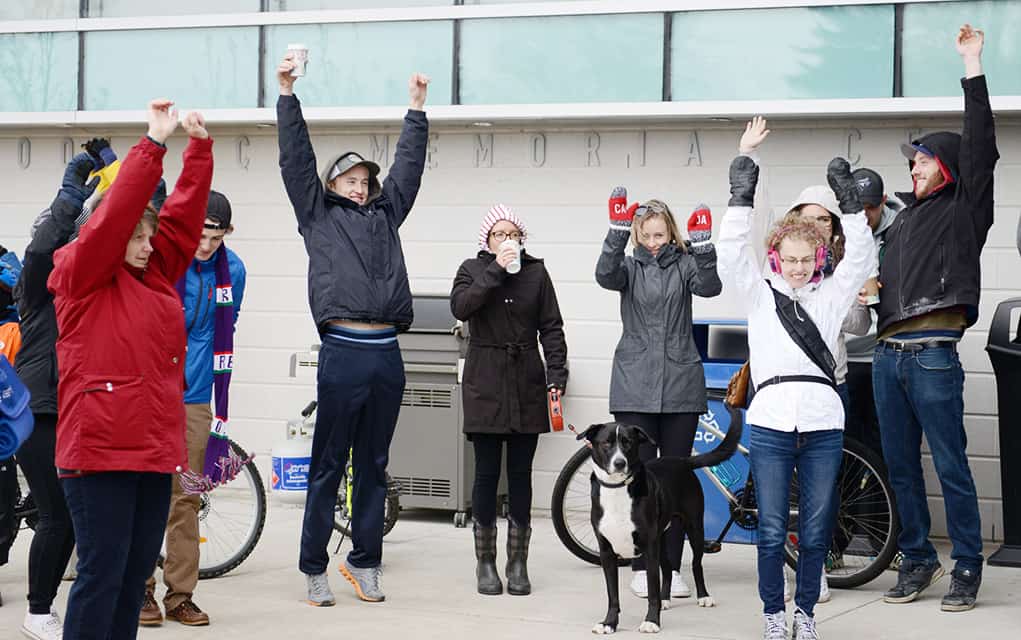What would we say when we’ve reached the end of our lives, and are granted one last look back? Do we react with remorse at the opportunities missed and the time wasted, or do we approach our end confident in a life well spent? These are some of the weighty questions being explored by the Grade 7 and 8 drama students at Elmira’s Park Manor Public School in their ambitious production of Our Town, the 1938 play by Thornton Wilder.
It’s a classic bit of 20th century Americana, following the lives of two individuals living in a small New England town at the turn of the century. The deceptively simple story spans 12 years, from 1901 to 1913, from the pair’s childhood to their young romance, to the day of their wedding, parenthood and, eventually, a funeral.
Along the way, through the microcosm of this small town, the story attempts an answer at the perennial questions about life, death and meaning.
“I think that the biggest issue is the emotional value,” says student Haley Seager of the challenge of the play.
“It takes a lot to actually put in the emotion and understand what some of these lines mean. Because you are playing with things that are so much bigger than we are, like death and the meaning of life and losing children and parents. And we’ve never experienced, of course, the meaning of life or death because we’re still living. So we can’t actually fully grasp them no matter how hard we try.”
The story is told in an unusual way, with the help of a narrator who regularly breaks the fourth wall to address the audience directly, and ruminate on themes of the play. Even the characters too, after their deaths on stage, will travel back to previous moments in their life to re-examine and reflect on their actions.
“She goes back to see her family, because she’s never going to see them again,” says Emma Lashbrook of her character, who passes away during the play. “And she tells them – she tries to tell them – the meaning of life, but they can’t hear her.”
For the young Grade 7 and 8 actors, it’s an incredible challenge adopting the persona of characters so far removed from themselves, notes Ted Frey, who co-directs the play with fellow teacher Emily Piche.
“It’s so interesting because you have 1940s social values looking back at 1910s social values and we’re in 2018, and the social values have changed again. It’s quite fascinating; it’s not in the same place these kids are at,” he says.
When Wilder wrote his play, he had the experience of having lived through the First World War, the 1920s, and the low, dishonest ‘30s. But the students of Park Manor have, in a sense, had even more time than that. And the young actors have to grapple with both their characters’ and the writer’s prejudices, perhaps no more apparent than in the stark treatment of the women in the play.
“It was so different because back then, you were kind of treated like a different species,” observers Emme Williams, who plays the role of the narrator. “Now it’s not that great, obviously. But back then, we were treated like animals. We weren’t treated like human beings.”
Even the narrator, notes Williams, who in Our Town is played as a male, the character has no qualms talking down to the female audience members.
There’s a line, she says, which begins, “I don’t have to point out to the women in my audience that those ladies they see before them…
“And I describe how a woman should act, basically,” says Williams. “I describe that they should be taking care of the children and they should be washing the dishes and they should be making breakfast, and it’s weird for me because I am a woman, and I have to describe the stereotypes of what a woman should be.”
With the complexity of its story and themes, and at an hour and half, the play is a mammoth effort for the young thespians to take on. But they sound confident in their work and proud of what they’ve been able to accomplish, and are encouraging people to come out and enjoy the show.
The play runs at Park Manor PS May 2 and 4. Tickets are $10 for adults and $5 for children.









